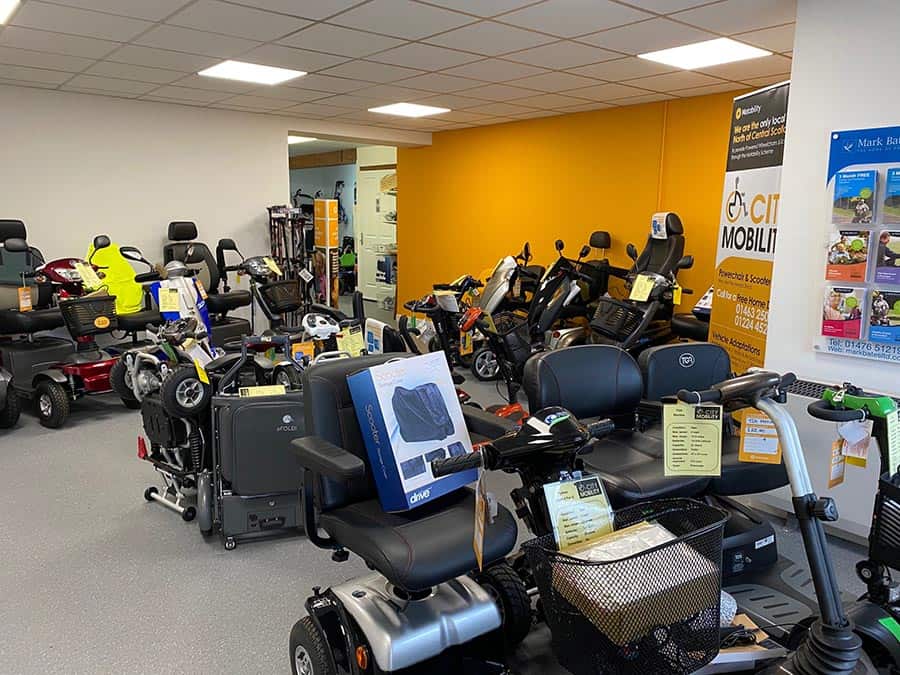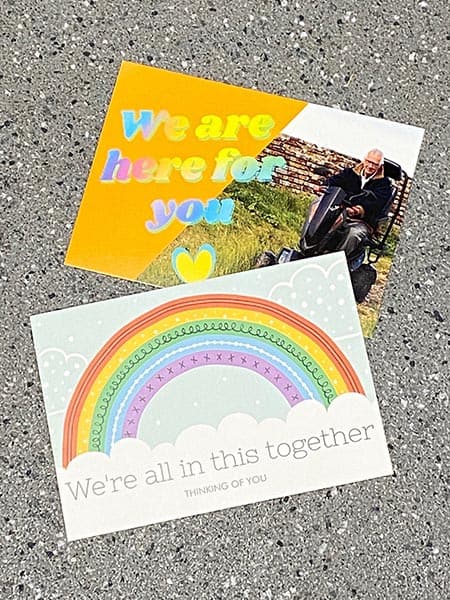Retailer Spotlight: City Mobility
Rising up to the challenge
The UK’s most northerly Motability powered wheelchair and scooter dealership, City Mobility is based in Inverness, Scotland. Its reach of customers covers just over half of Scotland but after the business was forced to close for all but essential purposes in March 2020, covering this huge area became even more challenging. Despite this, over the past year, the dealer has helped aid the UK’s vital COVID-19 vaccination programme by providing wheelchairs to help people attend their appointments. The firm’s staff also received their vaccinations to help protect its elderly and disabled customers. City Mobility’s managing director Carol Elliot talks to THIIS about the challenges of running such a unique business during a pandemic…
Carol Elliot lives on the Black Isle, just north of Inverness, with her husband and son. Having lived with rheumatoid arthritis since the age of nine, she certainly knows a thing or two about the challenges that come with having restricted mobility. Carol’s health condition, she says, has helped shape her personality and life as she always worked to achieve things on her own terms.
“I left school with hardly any qualifications as my schooling had taken second place to my arthritis but ended up getting a BA (Hons) in Psychology with the Open University as a young adult,” she recalls.
Overcoming challenges such as this led to Carol becoming involved in promoting accessibility and inclusion, either with voluntary groups or through previous jobs over the years.
“We are the most northern Motability dealer on the PWSS Scheme and concentrate on mobility scooters and powerchairs for Motability and private customers”
Before becoming the owner and managing director of City Mobility – a firm which was established in 2002 – Carol had been a silent shareholder in another mobility business until the outgoing owner, a friend, wanted to retire.
“I was never involved with the day-to-day running of a mobility business until then,” explains Carol. “After our due diligence processes and the timeous insolvency of the local branch of a national mobility franchise whose model didn’t get the challenges of the area we cover, my fellow shareholders agreed we should buy City Mobility, but only if I gave up my job and ran it.”
Always up for a challenge, Carol agreed and in January 2019 she took over the running of the business. With two of City Mobility’s four directors having a disability, the business is truly led by disabled people.
Let the games begin

City Mobility operates an Inverness-based showroom and workshop, and a shared showroom in Aberdeen with another Inverness-based mobility business.
Alongside supplying, servicing and repairing new and second-hand mobility scooters and powerchairs, the dealer services and repairs wheelchair lifts and hoists in vehicles and fits dual controls for driving instructors.
“We are the most northern Motability dealer on the PWSS Scheme and concentrate on mobility scooters and powerchairs for Motability and private customers,” explains Carol.
After Carol took over the business, she had just over a year’s “honeymoon period” to learn about the business before the challenges really began.
She says: “The staff, since day one, have been amazing and supportive as we got to know each other and we’ve pulled together to ensure we all come out the other end of the pandemic intact.”
Carol explains that the workload of her staff was on a downward spiral from the end of February 2020 as the business’s vulnerable customer base started shielding ahead of the national lockdown.
“The week before a national lockdown was announced we could see it coming so we started to work quickly to finish jobs and get equipment back to people ready to close the business,” she says. “When the announcement came on the evening of Monday 23rd March 2020, we were already prepared for it, so I just had to call the staff that night and tell them not to come in the next day.”
Keeping going
One of the first things Carol did was set up a ‘staff only’ Facebook page so that her and her staff could stay connected informally and “keep building on the team spirit we had nurtured.” It was also useful as a means to consult staff as the business moved forward.
City Mobility was forced to close for all but absolutely essential work, Carol says, so she was in the shop for three months on her own – as Scotland’s lockdown was longer than in England – dealing with essential calls, grant applications, furlough paperwork and the few essential jobs that other staff were usually responsible for.
“All staff appreciated the opportunity to have the vaccine to be able to offer further protection to our customers”
She continues: “Because our sister business still had essential staff working, I used them to fill the gaps and deliver loan equipment where we had to make do. I also made and posted out over 200 “We’re all in this together” and “We are here for you” postcards in May and November 2020 to all our PWSS Motability customers with comforting messages to let them know that we were thinking about them during these tough times, which I know were appreciated.”
Carol found that the rules and information in Scotland about the pandemic was generally “very clear and consistent”. She was pleasantly surprised, for instance, to find that City Mobility’s local MSP Kate Forbes, who is also the Scottish Government’s Cabinet Secretary for Finance, found the time to have a Zoom meeting with Carol to hear about the issues her business was facing.
Accessing business grant funding administered by the local authority was more of a challenge, however, she says.
“It took us six months to get our business grant and only then with the help of a ‘no-win-no-fee’ professional as we weren’t recognised as a retail business. We did however receive an award from the Scottish Pivotal Enterprise Resilience Fund recognising City Mobility’s unique role as a regional business in supporting the disabled community.”
Wheelchairs on loan
The business made headlines when it came up with the idea of offering free wheelchair loans for customers having the COVID-19 jab.
Says Carol: “We had a contract come to an end leasing wheelchairs to an airport for passenger assistance, so we wanted to put the secondhand wheelchairs to good use. When we got a call to ask about lending wheelchairs for the NHS Grampian Vaccination Centre we decided to do it for free.”
Fortunately, City Mobility’s business area remained in the lower of Scotland’s five-tier system so the business could, with the appropriate measures, continue trading once lockdown was lifted. The Boxing Day lockdown was the next official lockdown but the local authority had by then recognised City Mobility as an essential business, enabling the business to carry on as usual.

Since then, Carol worked on getting her team of nine staff vaccinated as the jab was not being offered automatically, she explains.
“I had to do a fair amount of leg work to get it but as soon as we reached the right person to ask, it was immediately actioned and our status was never questioned. All staff appreciated the opportunity to have the vaccine to be able to offer further protection to our customers.”
Serving a large area
City Mobility’s area covers just over half of Scotland at over 41,000 square kilometres, which is bigger than Switzerland.
“When you are travelling over 200 miles a trip you need to get it right first time”
Covering such a huge area with a small population is logistically challenging at the best of times but it was made especially so during the pandemic.
“With reduced economies of scale we have made a loss reaching our more rural mainland customers,” admits Carol.
A trip to the Scottish Islands to service Motability customers requires special permission from Island Local Authorities, she says, to make key worker hotel bookings and to use ferries. “And it took longer than usual because of reduced sailings and social distancing on crossings.”
Due to covering such a large expanse, Carol and her team says that they are always very thorough in their phone assessment process ahead of home demonstrations so that they can make sure they take the right products out to meet customers’ individual needs.
“When you are travelling over 200 miles on a a trip you need to get it right first time,” she laughs. “We have formed closer partnerships with those suppliers who have been very supportive of us this past year. “
Rising demand
Carol has noticed that customer demand has increased as people have realised that they valued being able to get out for their own shopping and daily socially distanced maneuvers.
“If we had traded for a full year it would have been even better than the last one,” comments Carol. “Demand has of course fallen for travel scooters and increased for more substantial scooters,” she adds.
COVID aside, with the UK leaving the EU Carol said she has already seen a difference in trading conditions. “Like other UK retailers we are seeing price rises due to increased freight costs and reduced margins, again this will have an impact on what we sell.
“Being squeezed in the middle between rising costs and not being able to pass them on to certain customers” is among the biggest challenges facing her business in the months to come says Carol.
Competing with internet businesses is also a challenge, she says.

“For once, where we live is an advantage to us as those internet ‘national’ businesses who know one end of a map from the other are beginning to realise that they can’t provide an after-sales service to the remoter reaches of Scotland.
“Those suppliers that have gone down the route of having a dealer and internet presence know referring their internet enquiries to us is the way forward for their products rather than competing with us.
“It does annoy me that the Department of Transport, in February 2020, called on all powered wheelchair and mobility scooter retailers to ensure customers are trained in the safe use of equipment but they have done nothing to ensure internet providers are bound to the same code.”
Carol says that she has seen more internet suppliers and businesses getting in contact with City Mobility to provide an after-sales service to their customers because they did not realise how far away addresses in this part of Scotland are, or they cannot get to them with travel restrictions.
Carriage costs to the Highlands and Islands is another nationally contentious issue, says Carol, who adds: “We won’t work with suppliers that don’t offer us the same prices as the rest of the UK.”
Facing the future
Carol is looking forward to building on the relationships that her business has with certain suppliers this year and getting to know their product lines. “Loyalty is a two-way street,” she remarks.
The business, she says, is already working in partnership with its sister company and selected suppliers to expand its mobility scooter presence across the area so that they can be more proactive in growing their Motability fleet in their dealership area.
“Staff will shortly be undergoing training in more complex powerchairs, a market we have not tapped into much at all. We are also carrying out sea trials at the moment of a new customer relationship and workflow database customer built by a locally based provider.”
Carol comments that City Mobility has recently been awarded a grant for IT equipment to equip its mobile staff with digital tools to use this database in order to better serve their customers’ needs.
The business has also started to invest in young talent. Just days before the March lockdown City Mobility employed a young engineer and they recently started a teenage trainee admin assistant through the Kickstart Scheme.
“Lastly, our expanding engineering team, as a sideline, already services electric powered golf buggies, which we have recently been promoting more widely, especially as our corner of ‘Bonnie Scotland’ is renowned for its world-famous golf courses!”




